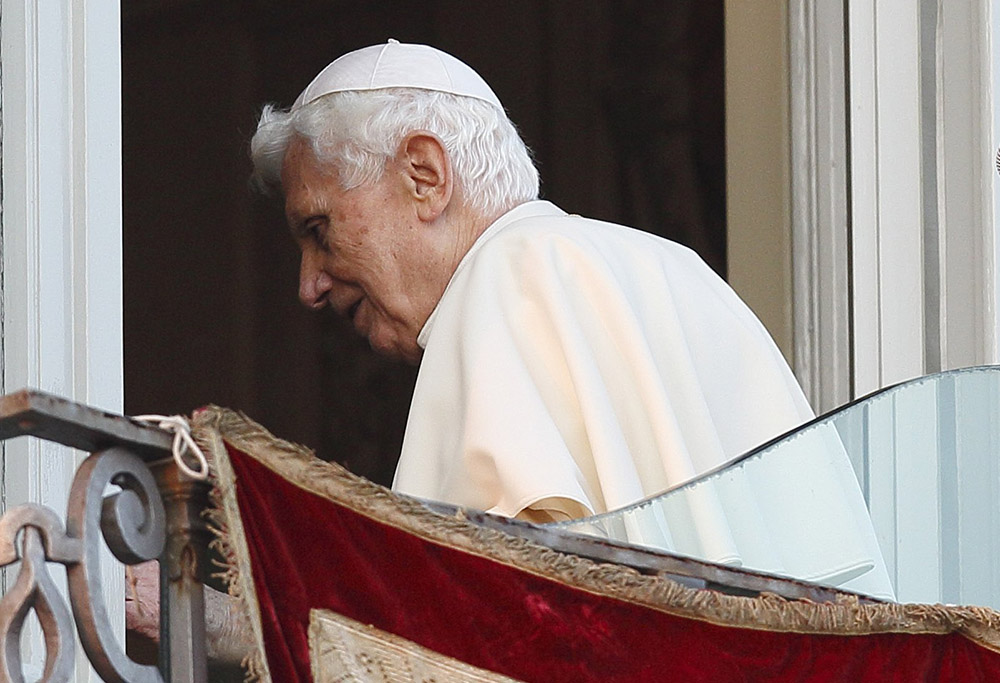
Pope Benedict XVI walks away after his final public appearance as pope in Castel Gandolfo, Italy, Feb. 28, 2013. (CNS/Paul Haring)
In some ways, last week's news was not particularly new: another independent report about sex abuse in the Catholic Church. We've had them from Pennsylvania, from France, and now from Germany's Archdiocese of Munich-Freising, the latest with details of nearly 500 victims over 74 years.
But this one is different, because among the bishops implicated in moving around offenders and covering up their abuse was a man who went on to become pope: then-archbishop, later Cardinal Joseph Ratzinger.
The 1,900-page report, released Jan. 20 by a Munich law office after a two-year investigation, accuses Pope Emeritus Benedict XVI of mishandling at least four cases of sexual abuse by priests when he was archbishop in Munich.
Ratzinger not only failed to discipline abusive priests, but also allowed them to continue in pastoral work, sometimes even after punishment by the secular judicial system. In at least one case, the perpetrator went on to abuse another victim.
"In a total of four cases, we came to the conclusion that the then-archbishop, Cardinal Ratzinger, can be accused of misconduct," said one of the reports' authors, Martin Pusch.
Ratzinger led the Munich-Freising Archiocese from 1977 to 1982 before being named the head of the Vatican's Congregation for the Doctrine of the Faith — the curial office eventually in charge of investigating allegations of clergy sexual abuse. Elected pope in 2005, he resigned in 2013, taking the title "pope emeritus."
In his 80-some pages of written testimony for the report's investigation, the 94-year-old Benedict initially denied any wrongdoing and drew some disturbing conclusions, such as indicating that a priest did not "act improperly" because he didn't touch prepubescent girls while masturbating in front of them.
Benedict's original testimony also insisted that he was not present at a 1980 meeting to discuss the transfer of a priest accused of misconduct. The report called that testimony "not very credible" and included minutes from the meeting that indicated Ratzinger was there. Benedict's secretary, Archbishop Georg Gänswein, has since said Ratzinger was present, calling the initial denial "an oversight in the editing of his statement."
Advertisement
Although we are still awaiting further response from Benedict and from the Munich-Freising Archdiocese, the report has already prompted sharp reactions. Survivors and church-reform groups have called on Benedict to take responsibility. Others are urging Pope Francis to impose a penalty on the retired pope — a move at least one canon lawyer believes is unlikely.
Conservative Catholic commentators who have railed against sexual abuse in the church since the 2018 uncovering of abuse by former Cardinal Theodore McCarrick seem torn when leaders of their ideological persuasion, such as Benedict and Pope John Paul II, are implicated. Some have brushed off the allegations against Benedict as just one of many made by many church leaders of that generation.
But this cannot become an ideological issue. And these allegations cannot just be dismissed as one of many generational errors. These decisions were made by an individual, one who went on to hold the highest office in our church and who still wears that office's distinctive white clothing.
We don't deny that, as pope, Benedict made some advances: He was the first to apologize for abuse and meet with victims. And he was better on this issue than his predecessor. When Benedict retired in 2013, Jesuit Fr. Hans Zollner said he had been a great reformer on sex abuse because he took the issue seriously and started to deal with it, even at the doctrinal congregation. But now Zollner, a member of the Pontifical Commission for the Protection of Minors since its creation, has called upon Benedict to make a personal apology.
We believe more than an apology is in order. We join the Survivors Network of those Abused by Priests, more commonly known as SNAP, in calling for Benedict to give up his title as "pope emeritus" — a designation fraught with complications even before these allegations of abuse cover-up. Perhaps he should also stop wearing the white cassock normally reserved for popes.
Benedict has already dedicated his final years to prayer, but to acknowledge his complicity in the scandal that has destroyed so many lives, a visible sign of penance is needed.







